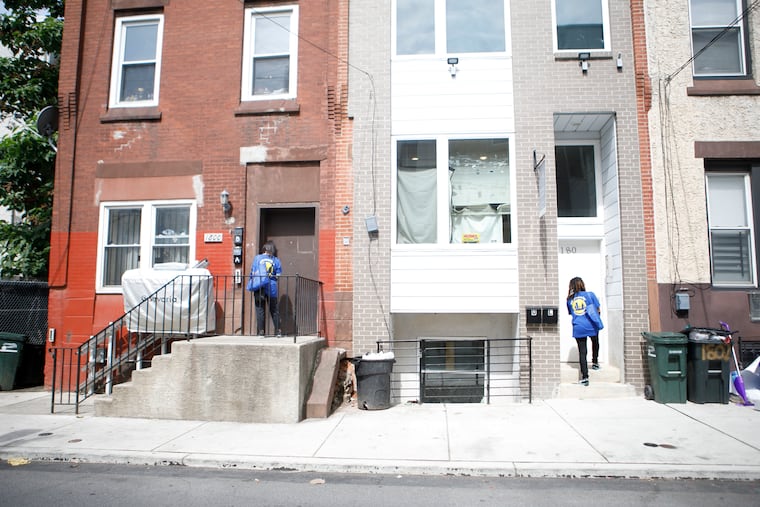Philly’s unvaccinated aren’t all conspiracy theorists or anti-vaxxers. They’ve just got bigger problems than COVID. | Opinion
Our work shows these residents understand the risk of COVID-19, but it is simply not high enough on their list of daily worries.

As almost any health professional will tell you, the best way for us to put the worst of COVID-19 behind us is to vaccinate as many people as possible. But that isn’t going as well as we would like — at the moment, less than 70% of Philadelphia residents ages 12 and up are fully vaccinated, and in some neighborhoods, the rate is significantly lower.
For the last several months, we and our colleagues at Temple University’s Lew Klein College of Media and Communication and the Lewis Katz School of Medicine at Temple University have partnered with Miriam Medical Clinics, Zion Baptist Church, and community stakeholders to boost vaccination rates in low-vaccination Philadelphia neighborhoods, particularly those around Temple’s campus. (In the 19140 zip code only half of residents have been fully vaccinated.) Together, we have spent hours speaking with residents of these neighborhoods, the majority of whom are Black and Latinx, about the reasons many of them remain unvaccinated.
The reasons may surprise you.
All too often, the media suggest that people who are reluctant to be vaccinated against COVID-19 have been swayed by misinformation-fueled conspiracy theories. A related narrative, particularly when talking about communities of color, describes the prevalence of distrust of health care and government. The logic that follows from these narratives is that if people buy into these beliefs and illness follows, then they have only themselves to blame.
» READ MORE: Helping overcome vaccine hesitancy was their goal. The surprise? Who was the problem.
But these explanations for low vaccination rates are woefully incomplete. They don’t acknowledge the significant number of people who are not vaccinated because COVID-19 is not the biggest concern in their community. That’s not misinformation — it’s fact.
Over the course of our work, we have found that the health and economic disparities that existed in Philadelphia before the pandemic have only gotten worse since. These health and economic disparities have now become a major contributor to some neighborhoods’ low vaccination rates. These residents understand the risk of COVID-19, but it is simply not high enough on their list of daily worries.
“In some neighborhoods with low vaccination rates, young people are far more likely to die from gunshot wounds than from COVID-19.”
For example, examine the very real concerns over gun violence, which has been an epidemic in Philadelphia for years. In some neighborhoods with low vaccination rates, young people are far more likely to die from gunshot wounds than from COVID-19. Yet most Philadelphians would agree that the response to the gun violence pandemic pales in comparison with our nationwide response to COVID-19. Why should young people worry about getting vaccinated against an infection that likely won’t kill them, when people in their community are urging some of them to secure life insurance, so that their families can pay for their funerals if and when they’re murdered? (That’s something one community member told us during our outreach.) Why should they sacrifice part of their paycheck to take time for a vaccine appointment and for potential post-vaccine side effects, when they are worried about making rent and putting food on the table? To the residents of North Philadelphia, violence, shelter, and food insecurity are of much greater concern than the COVID-19 pandemic.
Distrust and misinformation are, of course, major issues. Many community members talk about the Tuskegee Experiments, but one need not revisit the 1930s through 1970s to understand why many Black people distrust medical authority. Because health disparities disproportionately affect people of color, those living in our most oppressed neighborhoods have significantly lower life expectancy. Why should they put faith in a medical establishment that has not looked out for them?
While we are indeed grateful to our first responders and health-care providers who absorbed risks throughout the pandemic, there is still a great reluctance to acknowledge many other under-recognized workers who were also burdened with enormous risks on the front lines, including grocery store clerks, janitors, and transit workers. Many people living in poor, under-vaccinated neighborhoods have been doing this under-recognized work. To say now that we are surprised that many of them are distrustful of the system that has not been supportive of their sacrifice is disingenuous. Yet again, this highlights how historically, marginalized communities have been dismissed.
To continue to paint a portrait of all unvaccinated Philadelphians as foolish and morally inferior is not only incomplete but unjust. Rather than helping our city, such discourse creates more division and resentment. We must start seeing the pandemics of inequity that face thousands of Philadelphians every day. It’s time to stop treating COVID-19 and vaccination hesitancy as a problem of misinformation and distrust, and start treating it as a beacon that highlights the larger problems of generational injustice, health, and safety disparities in our city.
Cornelius Pitts is the director of the COVID-19 Vaccine Project at Temple University’s Lewis Katz School of Medicine. Lauren Kogen is an assistant professor at Temple University’s Lew Klein College of Media and Communication.